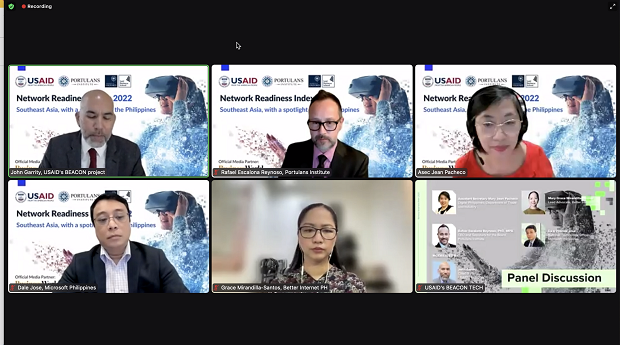The Philippines still has a long way to go in improving its digital competitiveness as it ranked 71st out of 131 economies in the annual Network Readiness Index (NRI).

The report’s 2022 ranking assessed the digital readiness of 131 countries and ranked these economies based on their performance across four key pillars: technology, people, government, and impact.
In an online launch hosted by USAID BEACON last Nov. 16, NRI researchers and stakeholders discussed the implications of this ranking for the Philippines.
Rafael Escalona Reynoso, CEO and secretary for the board of the Portulans Institute that conducted the NRI, began his analysis by pointing out the country’s strengths.
He noted that despite the Philippines middling ranking, the country showed the most improvement out of all NRI nations and rose by 12 positions to its current place.
Reynoso additionally highlighted how the NRI revealed the country’s strengths. Namely, these were its People and Impact pillars because of the relatively high levels of ICT usage by individuals and the nation’s participation in the network economy that produced remarkable impact.
Yet, while the country showed improvement in the rankings, Reynoso revealed the Philippines remains the laggard in South East Asia and Asia Pacific in terms of performance across all four NRI pillars.
Unlike most SE Asian nations that outperformed other regions in terms of the Technology pillar, Technology is the Philippines’ weakest area. Reynoso added that another vulnerability the country needs to address is Governance.
Other speakers jumped in during the panel discussion to expound on the areas where the country needs to improve its digital competitiveness.
Dale Pascual Jose, Microsoft Philippines national technology officer, specified that the Philippines needs to broaden its cloud-first policy, hasten artificial intelligence adoption, and push for a whole of society approach to cybersecurity threats.
“[Technology] implementation is key and continuously enhancing it so it aligns with the swift changes or updates in technology,” Jose stated.
Regarding Governance, Jose suggested that the government should modernize its procurement models. This action, he said, will allow the bureaucracy to respond and provision services quickly, as well as support and spark innovation in both private sector stakeholders such as startups and public sector actors like government agencies.
Mary Grace Mirandilla-Santos, independent telecom and ICT policy research analyst and advocate for Better Internet PH, focused on the gap in ICT access between urban and rural areas.
She identified factors affecting rural inclusion such as less developed broadband infrastructure outside urban areas, high mobile tariff and the lack of competition between telecom providers.
She added that cybersecurity and linked to that, trust in Internet services like e-payment, must to be nurtured to increase adoption in rural populations.
“It is actually quite alarming that up to now, considering that the pandemic was supposed to have accelerated digitalization and with that deployment of infrastructure, we see that access is still very much wanting. Regulation and inclusion are indicators that we need to improve on,” Mirandilla-Santos stressed.
To support this point, Reynoso recommended that to maintain the momentum that propelled the Philippines to its current NRI rank, one of the country’s priorities must be inclusive recovery in the new normal, or recovery that includes the interests of marginalized groups and the youth. The latter especially will have an important part in shaping the digital future, he said.
“We’ve reached the 8 billion [world population] mark… we’re talking about a very enormous generation of young people that will have to be included not only as users, but as a group that has a decision-making role in planning and designing,” he pointed out.
The event was closed by Eric Florimon-Reed, deputy director at USAID.“A robust and thriving digital ecosystem means that Internet service is fast and affordable, government services are accessible, and conducting business online is safe and easy,” said Florimon-Reed.
“As a friend, partner, and ally, the US government will continue to support the Philippine government in building a future where digital technology promotes inclusive growth, resilience, and strengthens democratic societies,” he said.




